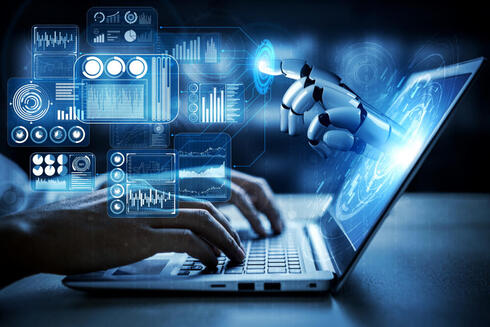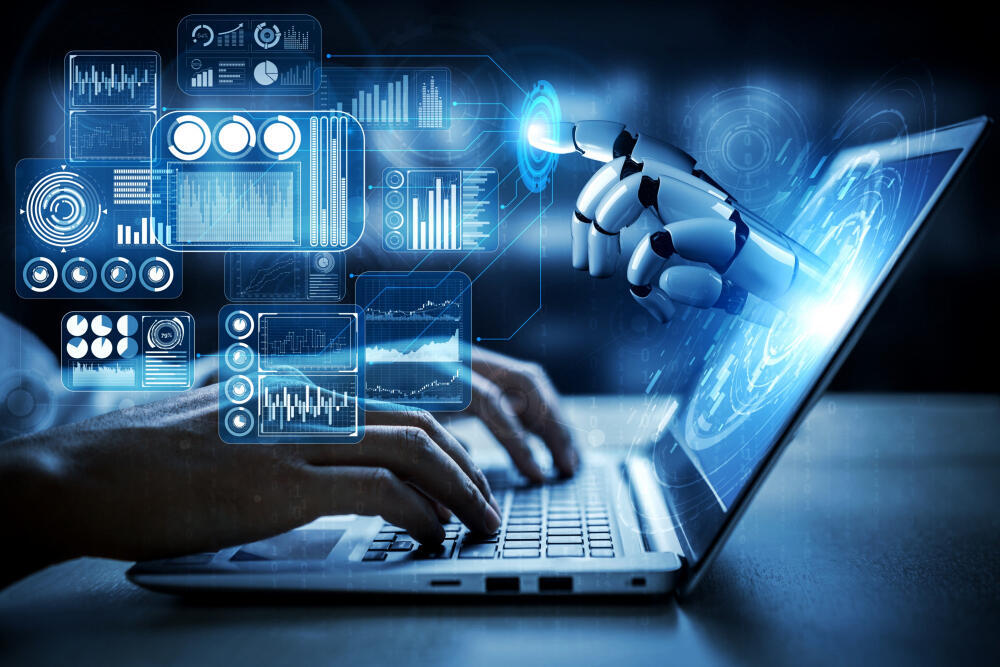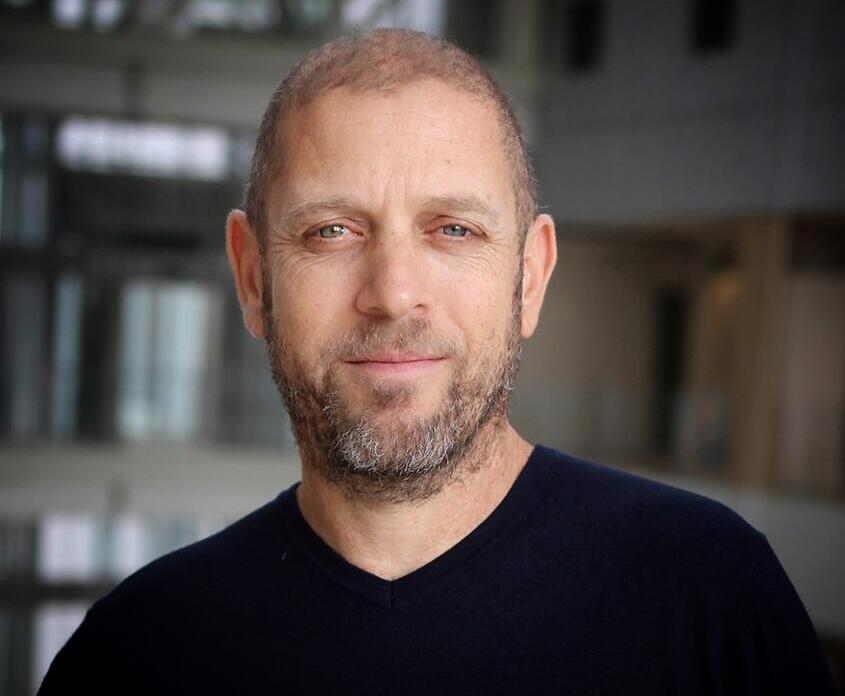
You can’t spell ‘raise’ without AI: Study shows AI users earn more
A huge study found that using artificial intelligence increases by six times the chance of employees getting paid more and that they see these abilities more as a "co-worker" than a threat
Let's say you consult with a co-worker, you work together, as a team, and it optimizes work and productivity. But then, one day, the colleague's abilities surpass yours. The management decides to reduce the workforce because the work has been streamlined. There is simply no need for so many workers doing the same thing. Who will they decide to fire in such a case?
When it comes to two human employees, there is no doubt that the employee with the least abilities will be fired, but today there is a new player in the labor market: artificial intelligence. In recent months, powerful artificial intelligence tools have stormed into our lives with the potential to completely change the way we work. Along with the great promise, there is also a real fear that these tools will be perfected to such an extent that they will completely eliminate the need for people in certain areas. About a year ago it was DALL-E that demonstrated drawing and design capabilities without human contact and about three months ago ChatGPT emerged, which is an artificial intelligence tool with impressive capabilities to write articles, draft emails, invent recipes and even write code.
No one yet knows what the exact impact of these tools will be on the world of work, but what is certain is that artificial intelligence is already changing the world. Doctors, lawyers, programmers, designers, customer service representatives, teachers and all other employees who do not adopt the existing tools in their work will be left behind.
This fear that artificial intelligence will surpass human capabilities and thus eliminate the need for human workers led BCG, Boston Consulting Group, and MIT to conduct a study designed to examine the adoption of artificial intelligence and its impact on organizations, teams and employees. The study examined 1,700 employees from organizations from all over the world and found, by and large, that most employees who use artificial intelligence capabilities perceive it as a 'co-worker' and not as a threat. They derive personal value from it and are six times more likely to obtain significant financial benefits - that is, to receive a bonus, promotion or raise.
Right now, there is no difference between truth and lies
In the last decade, the artificial intelligence tools that were used in the business context were those that made it possible to take large databases and use them to generate insights in order to help professionals make decisions in a better way. In recent months, Generative AI, the artificial intelligence that can create something out of nothing, has broken out. "If you take the global workforce, most people need to be either more creative or more efficient. Today there is another player in the field that wasn't there before and it will definitely have an impact on the labor market," says Hod Fleischman, a partner at BCG X, the technology body of Boston Consulting Group.
According to him, AI tools will reach all professions in the future. Right now, the reason AI tools are having a major impact on the design, marketing and content professions is an inherent problem with the way this technology works - that it has no layer of truth. Artificial intelligence tools do not differentiate between truth and lies. The potential of artificial intelligence tools for lawyers in drafting documents, and for doctors in treatment recommendations, is understandable, but at the moment it is impossible to trust the technology completely.
"Today we see the adoption of these tools in the areas of writing text, in fashion, and in retail. There are solutions, for example, on Alibaba's websites where you can build a sales page by pouring in all the information and it will bring the images, write the text and even create a video of the product at the end. In these areas it moves very quickly. In other areas it will come," said Fleischman.
In the not too distant future, it will not be possible to avoid using artificial intelligence to improve work. "The programmers who use GitHub will use these tools to write better code. Now they are starting to embed artificial intelligence in other office products. It simply won’t be possible not to use AI, it will already be part of the way the product works. For example, instead of creating spreadsheets in Excel, simply describe what you want to create. Before artificial intelligence replaces humans, it will improve the performance of employees and also take some jobs away from professionals, for example interior designers or architects, and will allow others to do the same with the help of artificial intelligence."
The first employees who are under considerable threat are the creative employees such as designers, content writers, etc. "They need to learn new ways and so do the knowledge workers who delve deeply into a certain field and have built their careers around it," he said.
Last week, Wired magazine published its rules for using creative artificial intelligence, rules designed to determine when the magazine will use artificial intelligence. For example, the magazine announced that it will not publish stories with texts produced using AI unless the production of the text using artificial intelligence is the entire purpose of the story. Also, the magazine stated that it will not publish articles edited using artificial intelligence but will use artificial intelligence to suggest headlines or posts on social media.
"These new magazine rules are like what the wagon drivers would have said with the invention of cars, that they would only use trucks to transport heavy loads, but for short-term light loads we won't use them. How much of this has to do with purity and how much of it is the old guild trying to protect itself from technology?" said Fleischman.
Consult with 1,000 colleagues at the same time
Taboola announced about a month ago the integration of ChatGPT technology and other Generative AI technologies into their platform with the understanding that the assimilation and use of the new technologies will change the way advertisers create ads and optimize their campaigns. Such technologies are adopted throughout the organization in human resources, development, the legal department, marketing and sales. "To say that my organization is not adopting AI technologies today, end to end, is like saying that we would not have adopted the internet 20 years ago. Companies that do not use AI will simply not survive," said Eldad Maniv, President and COO of Taboola.
"Every technological leap in history has led to improved productivity. So, of course, there is a redundancy of certain roles, but on the other hand, new roles are being created, such as Prompt Engineer. We are at the beginning of the journey, and it is difficult to imagine the variety of new roles that AI will create. In short, the revolution of AI is positive for the job market, the opportunities are infinitely greater than the threats, and it is important to know how to adapt to changes."
At Stratasys in Israel, the adoption of artificial intelligence enables a rapid overcoming of the English language barrier, an issue that is critical in communication with global customers. Also, company employees use artificial intelligence for thinking and brainstorming. "In my view, every manager should encourage and push his employees to adopt and embrace technology. I strongly encourage my team and employees to be exposed to technology and use it to free up more time for thinking and providing the added human value, for example in creating a strategy. I think it is the duty of managers today to not leave the employees behind," said Yonatan Snir, VP of Global Marketing at Stratasys.
The optimization of work through artificial intelligence can come at the expense of human workers who will no longer be needed. For example, if today a company employs 20 designers and with the help of artificial intelligence it is possible to reach the same output with only three or five designers, then there is no logic in continuing to employ 20 people. Despite this, all the organizations we checked with that have adopted artificial intelligence tools said there are no plans to reduce staff.
"The adoption of artificial intelligence tools can later come at the expense of people who are afraid of changes in general and technological changes in particular. Those who do not adopt the technology will actually be left behind and may be irrelevant to their organization. In terms of the scope of hiring employees, in the short-term I think there is no material impact, but in the medium and long-term it can certainly have an impact, therefore it is expected that organizations will be leaner, more efficient and more professional," said Snir.
In the last eight months, Syqe began to implement the use of artificial intelligence tools as an integral part of the work processes of each of the company's departments. So, for example, in the field of user experience, they use the visual tools DALL-E and Midjourney to solve problems. "Together with ChatGPT, we understand the target audience and then look again at the solutions with the visual tools," said Geva Rosenthal, VP of Innovation and User Experience at the company. "I'm not one of those who are afraid, I'm one of those who understand that this is something that can really help us and I'm inspired by it. From the industrial design side, it's like consulting 1,000 designers," he said.
Most employees experience working with AI in a similar way to Rosenthal.The BCG and MIT study showed that about 60% of respondents felt that artificial intelligence tools were like co-workers and that employees who use AI in their personal work are 3.4 times more likely to be satisfied with their work compared to employees who do not use artificial intelligence.
Because there is still an issue of reliability, the technology is still expensive and the ethical boundaries of its use have not yet been defined.
In later stages, as the technology develops, artificial intelligence will be more reliable and it will be possible to begin to imagine a scenario in which it replaces the recommendation of a doctor or a lawyer. "Artificial intelligence will not replace doctors, but doctors who adopt artificial intelligence will replace those who do not use it," said Gur Roshwalb, a partner in the aMoon VC fund which focuses on innovation in the medtech and life sciences sectors. "The starting point is that today there is a real shortage of medical professionals and we feel it every day, so the first emphasis is that the adoption of technology, especially of artificial intelligence, contributes significantly to expanding the capabilities of doctors and medical teams so that they can be more efficient. Therefore, we do not expect that there will be fewer doctors because the challenges are enormous and the demand is very high."
In the context of medicine, we are talking about artificial intelligence that primarily enables the examination of huge amounts of data and the generation of insights. "Doctors sometimes make mistakes not because they haven't seen the data, but as a result of being influenced by biases, previous thought patterns, searching for a certain element. For example, if I made a mistake with the last patient in a certain aspect, I will constantly look for that mistake even though it may be irrelevant to the next patient and distracts me. Artificial intelligence helps us dramatically in diagnosis because it looks at the data cleanly, and beyond that can look for patterns that doctors cannot discern. This is an example and proof that it does not replace the doctors but helps them better understand what and how to treat," said Roshwalb.
Similarly, lawyers will probably not be completely replaced by technology, but yes, it will change the profession in a noticeable way. "In the long term, we anticipate that technology combined with the needs of our clients will change the common business model in the field of law. The hourly pricing model will change and lawyers will actually price the added value they provide the client," said Anat Ben Barouch, VP of Business Development at Shiblolet & Co Law Firm.
Already today, AI technologies designed to assist legal work are being implemented at the law firm. "In practice, there is a considerable part of the lawyers' work that is essentially bureaucratic and technical, and a smart tool can help to do it in an efficient and agile way. This leaves much more time for learning, mentoring and professionalization on the legal or business side," said Tamar Harmati, Head of Innovation at Shibolet.
The question of whether technology has the potential to replace human workers comes up all the time, and when it comes to artificial intelligence, it's about capabilities that most of us couldn't imagine just a few years ago. The simple answer to this question is yes, artificial intelligence can replace some of the workers, but at the same time it can be said that new professions will be created and those who learn to use the new tools to improve their work, its efficiency or professionalism, will continue to remain relevant and according to BCG and MIT research, are even expected to earn more and be more satisfied with their work.
"AI can replace people in certain fields such as graphics, product design, marketing writing and especially short writing to describe a product or marketing. Any topic where the information that exists on the web leads you to the right conclusions and that is without emotion or a personal element. That’s where the human element is especially important for supervision," said Eyal Niv, a partner in the Pitango venture capital fund, which invests in companies in the field of artificial intelligence. "We are not yet at the point where the machine completely replaces a human being. At the same time, the involvement of the regulator is necessary to pay attention to the extent to which the machine is allowed to work independently, especially in the worlds of medicine, aviation, and automobiles. In China, for example, the content created by a machine needs to be marked as such. In light of the bad effects of fake news, it is important to remain vigilant that it serves good purposes. Generative AI is the beginning of the third wave of development of graphic and mechanical models. That's where we're heading and that will replace people."
















